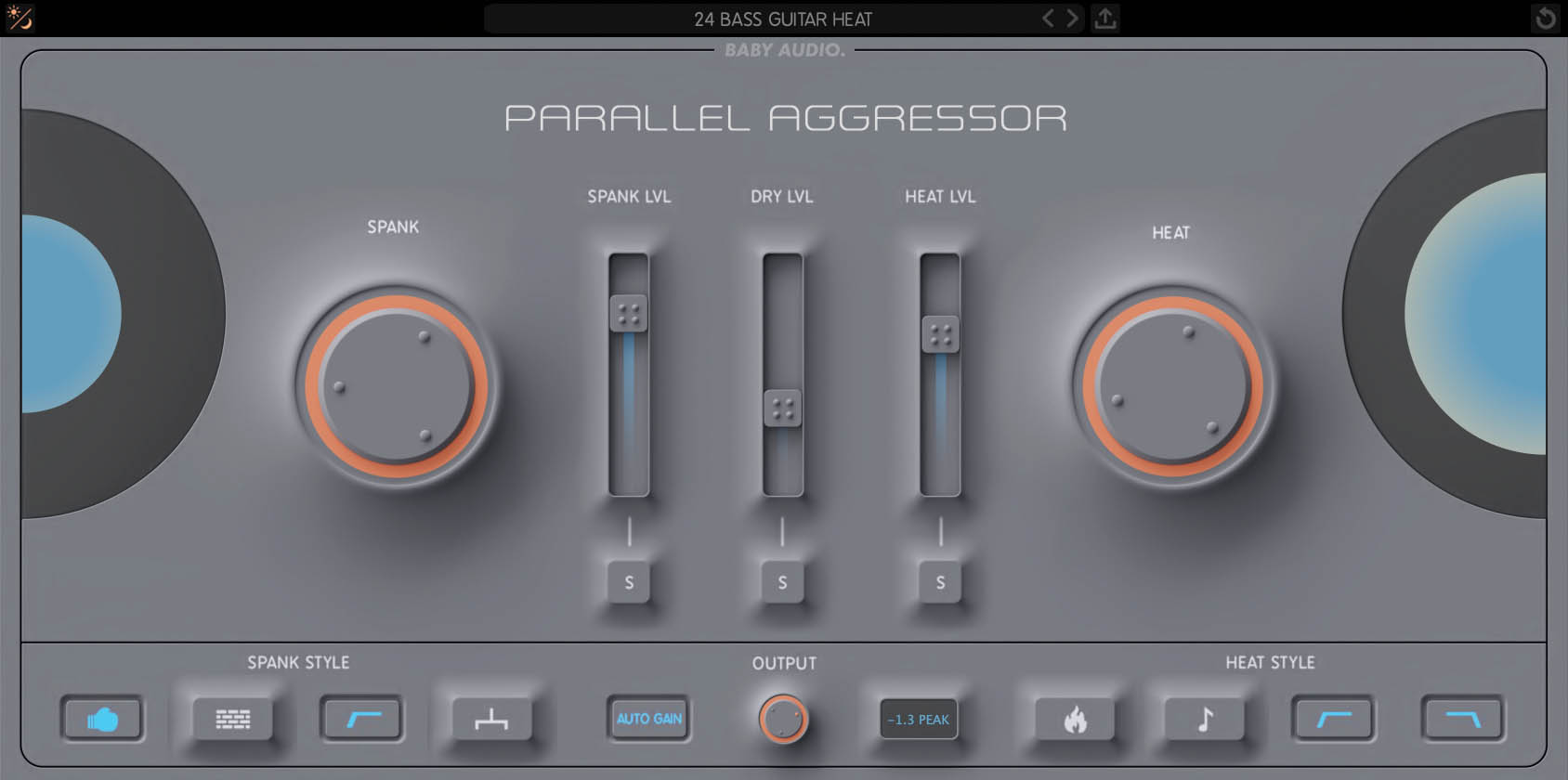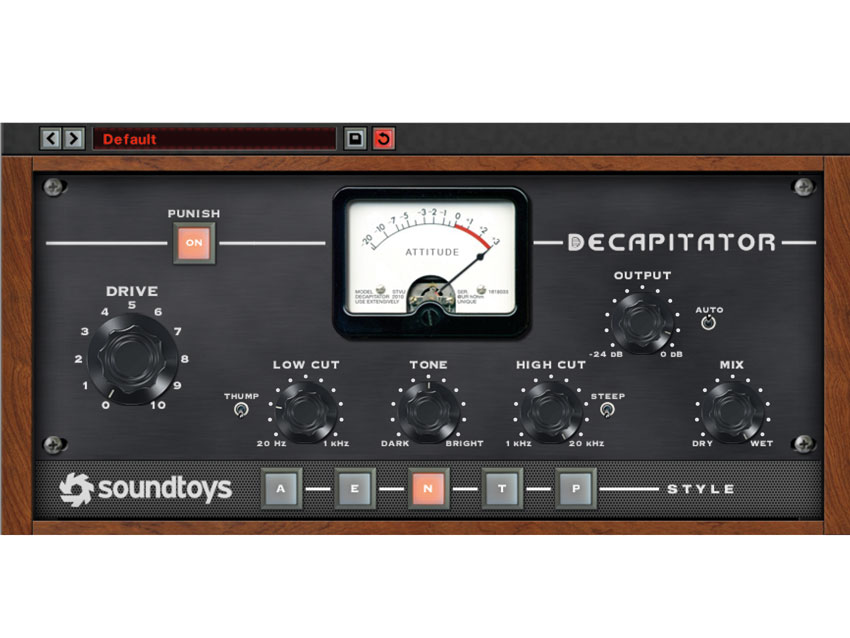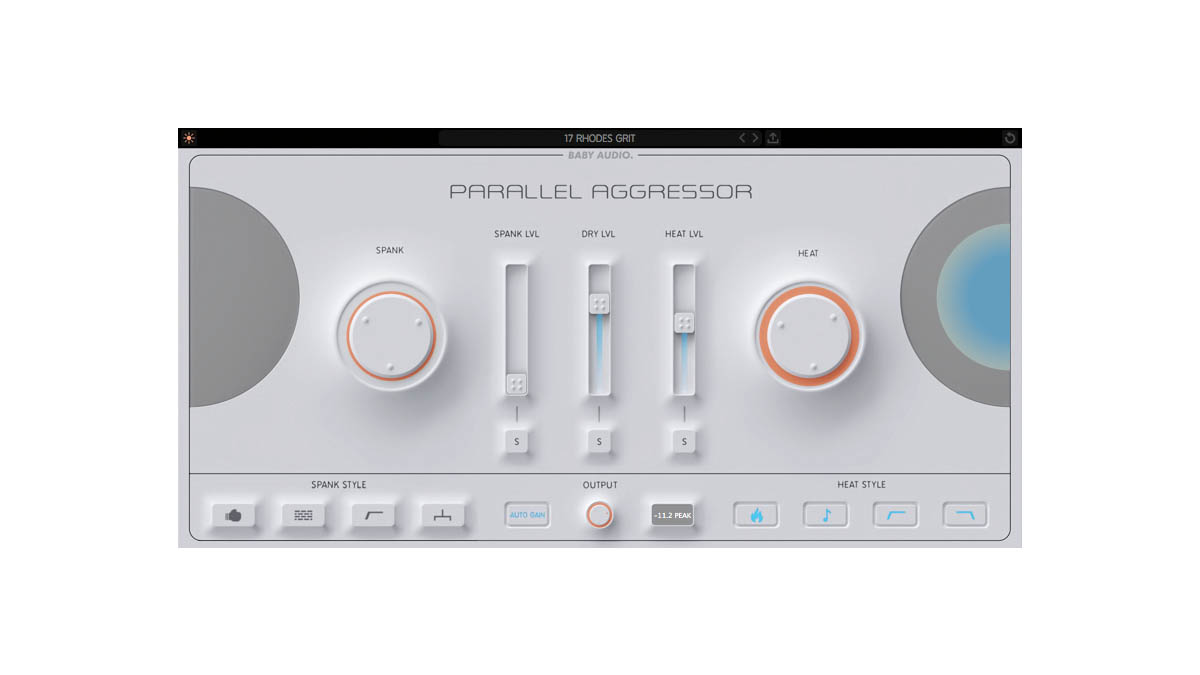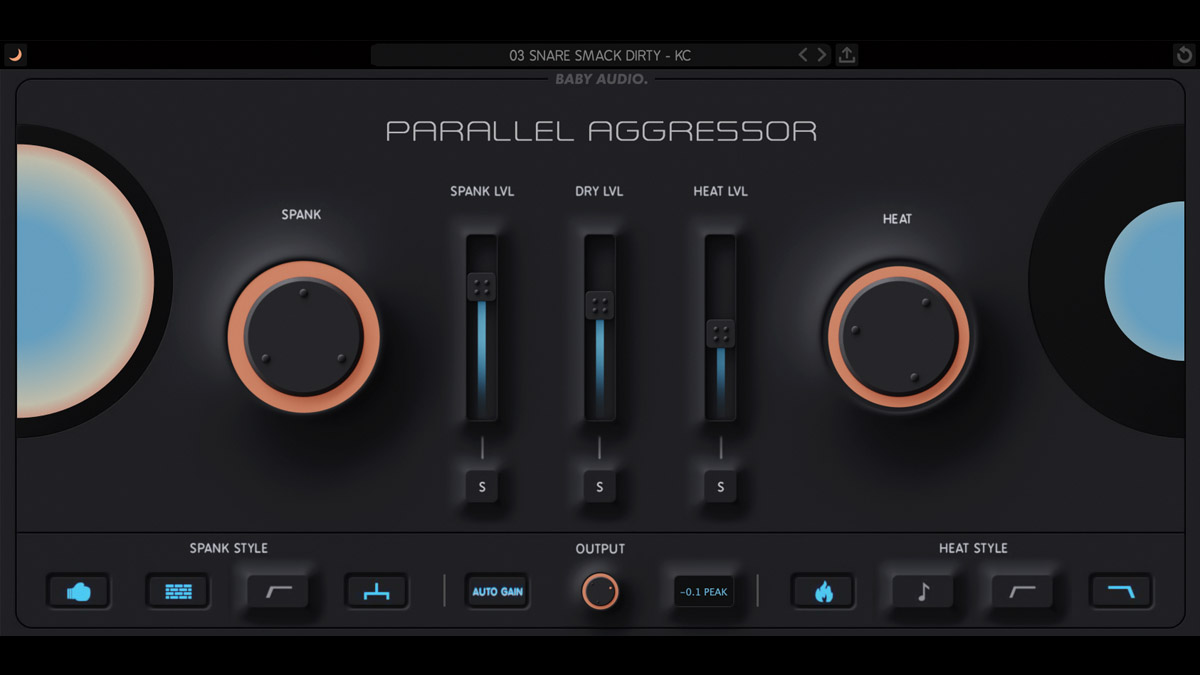MusicRadar Verdict
Unashamedly colours your source sounds using compression and distortion… and then lets you blend it to taste. Magic!
Pros
- +
Core algorithm for great flavour.
- +
Very useful auto gain feature.
- +
Simple mixer.
- +
Mixer's solo option balances parallel chains and dry signal.
- +
Decent tweaking and colouration options.
- +
Great price.
Cons
- -
No mute option for faders.
MusicRadar's got your back
What is it?
Baby Audio is an LA-based boutique software developer with a handful of plugins, including Comeback Kid, which is a highly flexible delay with in-built transient shaper, tape saturation and modulation, and Super VHS, which is a multifaceted tape saturation and noise effect.
Last year they released I Heart NY, a flavour filled black box-style parallel compressor designed to quickly inject some classic Stateside punch and colouration into your sounds.
Emboldened by the success of this simple plugin, their latest release, Parallel Aggressor (AU, VST2, VST3, AAX) sticks with the parallel concept (see boxout) but ups the ante, extending it to two separate processing chains.
Parallel Lines
Parallel Aggressor’s two processes are compression (Spank) and saturation (Heat) which alongside the original dry signal are balanced using a 3-fader mixer. This includes a handy solo feature so you can listen to each individual element, although you can’t mute the faders, which would have been handy.
Much like with I Heart NY, the specifics of each process are hidden and you simply use the respective knobs to set the intensity of the processing. However, unlike on I Heart NY, you get four Style settings for each process and these provide additional tailoring to expand the basic effect.
It really comes into its own for proper colouration of beats, basses and beyond
Spank is very similar to the I Heart NY effect but with improved sound quality and signal detection. The four style options are transient shaping (Extra Punch), more aggressive effect (Extra Smack), fixed low-cut for the sidechain, and a mono option.
Heat meanwhile uses an optimised version of their Super VHS tape saturation algorithm. The style options add more distortion (Extra Hot), add mid-range bite (Tone) and apply high and low-pass filtering at 150Hz and 7.5kHz respectively.
You can use any combination of Style options and the buttons appear in signal flow order, so it’s clear for example that the Heat filters are applied to the post distorted signal.
Finally, in addition to an overall Output level (+6dB to -24dB) to help you stay on top of levels, there’s an Auto Gain option that sets the combined processed output level so it roughly matches the original input level.

Hit It
It’s always quite interesting to analyse what’s happening with a plugin, and unsurprisingly we can see on the analyser that the Heat effect adds odd harmonic distortions. These are further enhanced by the Extra Heat setting, which adds quite obvious high-frequency harmonics.

• Soundtoys Decapitator
If you’re after saturation flavour this plugin is an absolute must-have and is modelled on some classic hardware.
• Waves Scheps Parallel Particles
Two pairs of parallel processors provide bite, thickness, air and sub.
Maybe less expected is that the Spank effect also adds some 3rd harmonic distortion. Either way, Parallel Aggressor is clearly trying to colour your sounds.
Each effect is applied using a simple intensity dial and you get some good visual feedback from both knob halos which change thickness and also from the semicircular meters on the left and right-hand sides of the plugin.
Parallel Aggressor’s default setting loads up with the dry fader at 0dB, each effect fader at -10dB, and the amount set to 50 (it has a 0 to 100 range).
So, if your input signal is reasonably healthy, it’s quite possible this will already be colouring your sound, and we found the fader solos really useful to ascertain what was happening.
Performance and verdict
Clearly, you can use Parallel Aggressor however you like – with some care – and if the source audio is suited it can add a bit of flavour to the master buss. However, it really comes into its own for proper colouration of beats, basses and beyond.
On kicks, for example, the basic Spank setting quickly livens up a lacklustre sound, but adding in the sidechain filter allows you to really hammer it without it pumping. Throw in the Extra Smack effect and things get really coloured. Adding in some of the Heat effect then enhances the high frequencies, and you’ve got a massively transformed sound.

The same technique works for snares and we found it really easy to get snappy snare sounds, often blending in just a little of the dry signal to retain the attack. On more ambient sounds such as drum kit room mics, it’s fun using more pumping compression, and the saturation can really dirty up a lacklustre sound and give it some character.
Looking further afield we had success with various bass sounds including DI’d electric bass and synth basses, and the Heat effect also benefited various other synth sounds and worked really well on electric piano.
For these uses the high and low-pass filters are really useful, and although you may want to tailor the sounds further with your own EQ, it’s impressive how much you can achieve with this one plugin.
Conclusion
Setting up your own parallel processing is very flexible but the setup can be a pain and managing the various levels tricky. What we really like about Parallel Aggressor beyond the great sound, is the ease of use.
Overall, Parallel Aggressor serves up its own ready rubbed colouration offering just enough in the way of tweaking to keep things interesting.
MusicRadar verdict: Unashamedly colours your source sounds using compression and distortion… and then lets you blend it to taste. Magic!
The web says
"I found Parallel Aggressor to be a fantastically simple to plugin to use. The only challenge is deciding just how you want to shape your audio. The added functionality to the compression and saturation sections of I Heart NY and SUPER VHS push these concepts to new limits."
EverythingRecording
Hands-on demos
Al Be
ADSR Music Production Tutorials
White Noise Studio
Specifications
- TYPE: Parallel compressor plugin (AU, VST2, VST3, AAX)
- KEY FEATURES: 2x Parallel engines (Spank compression engine and Heat saturation engine), Metering, Solo function, Auto Gain, 25 pre-loaded presets, 3 interface colour schemes
- CONTACT: Baby Audio
Computer Music magazine is the world’s best selling publication dedicated solely to making great music with your Mac or PC computer. Each issue it brings its lucky readers the best in cutting-edge tutorials, need-to-know, expert software reviews and even all the tools you actually need to make great music today, courtesy of our legendary CM Plugin Suite.
With its latest free update, Ableton has finally turned Note into the app I always wanted it to be
Technically capable, but struggle to make your tunes sound musical? 5 simple music theory hacks to make your tracks stand out
"Despite its size, it delivers impressive audio quality and premium functions as well as featuring a good selection of inspired sounds": Roland GO:Piano 88PX review











